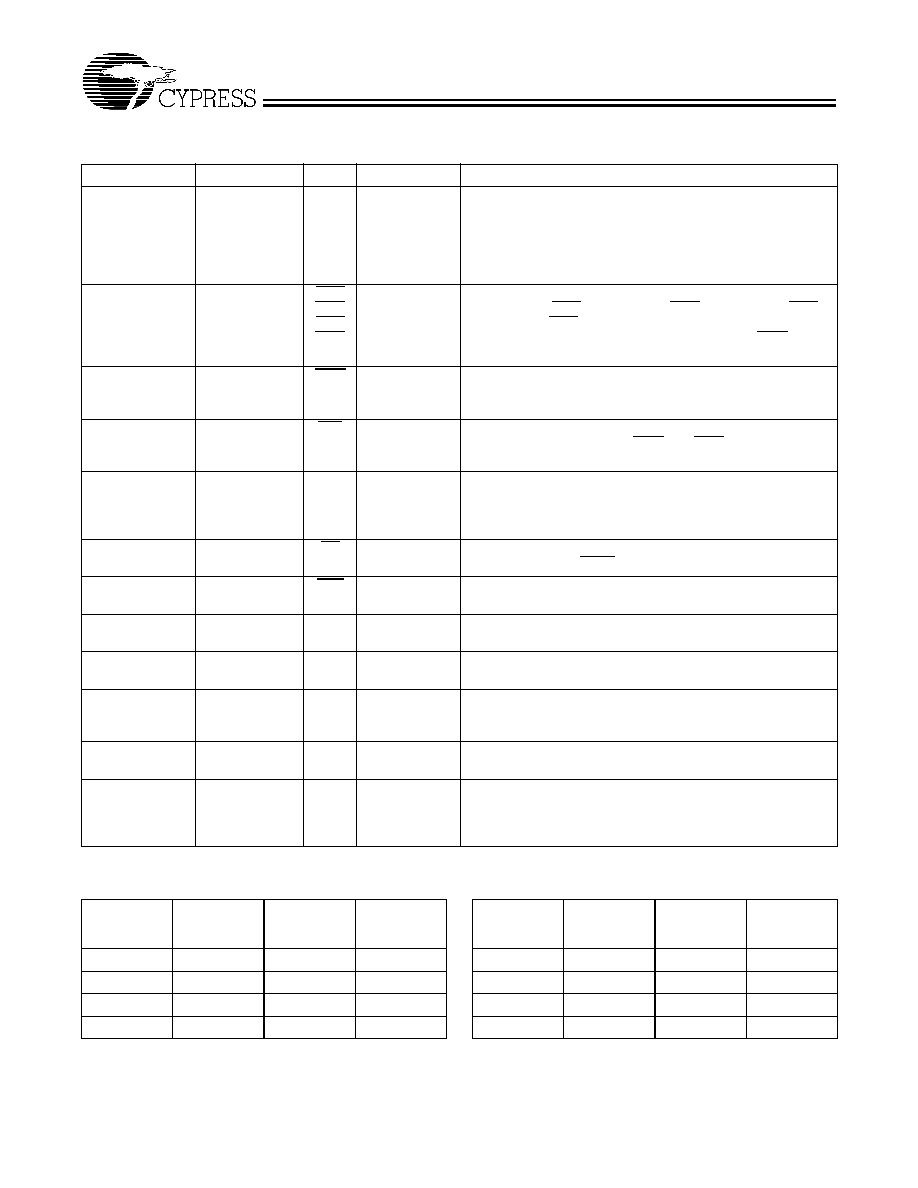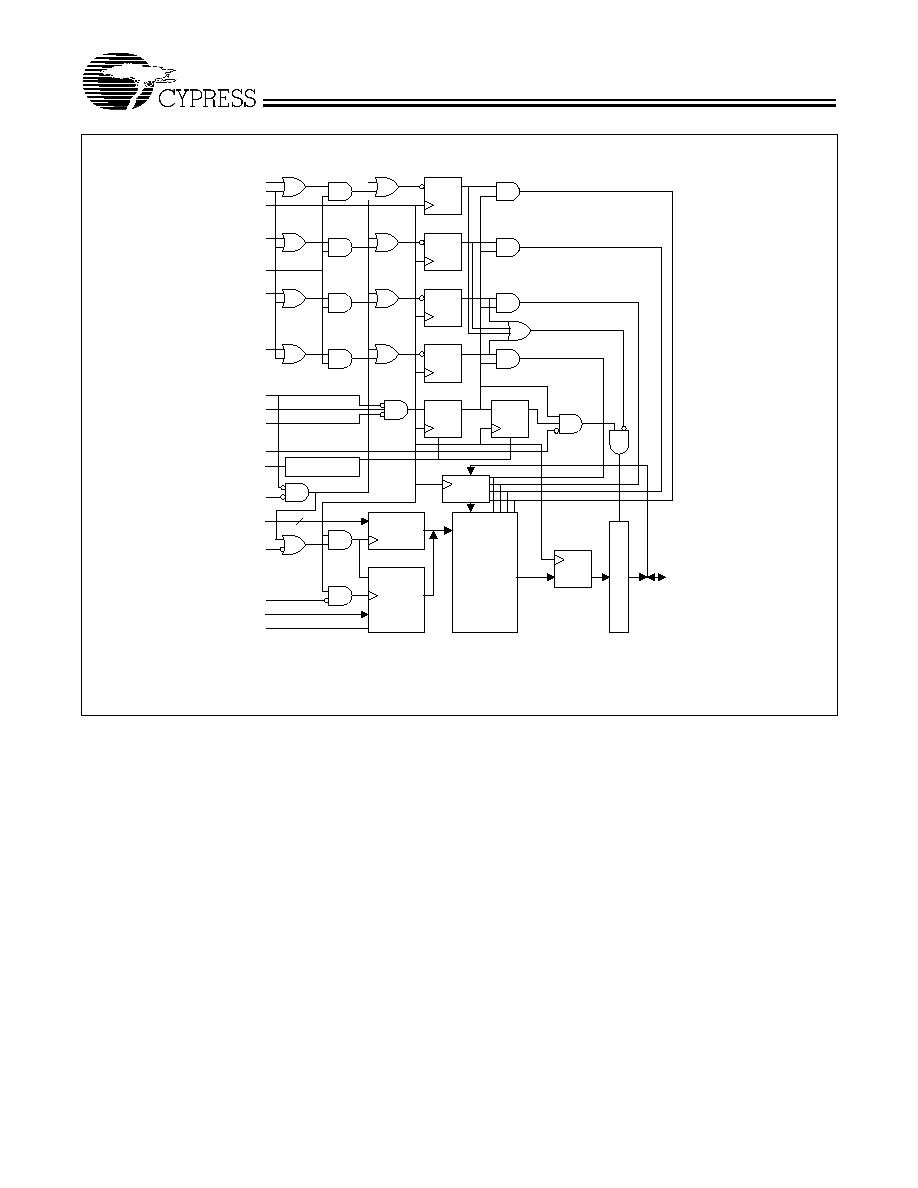
128K x 36 Synchronous-Pipelined Cache SRAM
CY7C1347D
Cypress Semiconductor Corporation
∑
3901 North First Street
∑
San Jose
∑
CA 95134
∑
408-943-2600
Document #: 38-05022 Rev. *C
Revised January 18, 2003
327
Features
∑ Fast access times: 2.5 and 3.5 ns
∑ Fast clock speed: 250, 225, 200, and 166 MHz
∑ 1.5 ns set-up time and 0.5 ns hold time
∑ Fast OE access times: 2.5 ns and 3.5 ns
∑ Optimal for depth expansion (one cycle chip deselect
to eliminate bus contention)
∑ 3.3V ≠5% and +10% power supply
∑ 3.3V or 2.5V I/O supply
∑ 5V tolerant inputs except I/Os
∑ Clamp diodes to V
SS
at all inputs and outputs
∑ Common data inputs and data outputs
∑ Byte Write Enable and Global Write control
∑ Three chip enables for depth expansion and address
pipeline
∑ Address, data, and control registers
∑ Internally self-timed Write Cycle
∑ Burst control pins (interleaved or linear burst se-
quence)
∑ Automatic power-down for portable applications
∑ JTAG boundary scan
∑ JEDEC standard pinout
∑ Low profile 119-lead, 14-mm x 22-mm BGA (Ball Grid
Array) and 100-pin TQFP packages
Functional Description
This Cypress Synchronous Burst SRAM employs high-speed,
low-power CMOS designs using advanced triple-layer
polysilicon, double-layer metal technology. Each memory cell
consists of four transistors and two high-valued resistors.
The CY7C1347D SRAM integrate 131,072 x 36 SRAM cells
with advanced synchronous peripheral circuitry and a 2-bit
counter for internal burst operation. All synchronous inputs are
gated by registers controlled by a positive-edge-triggered
clock input (CLK). The synchronous inputs include all address-
es, all data inputs, address-pipelining Chip Enable (CE),
depth-expansion Chip Enables (CE2 and CE2), Burst Control
Inputs (ADSC, ADSP, and ADV), Write Enables (BWa, BWb,
BWc, BWd, and BWE), and Global Write (GW).
Asynchronous inputs include the Output Enable (OE) and
Burst Mode Control (MODE). The data outputs (Q), enabled
by OE, are also asynchronous.
Addresses and chip enables are registered with either Ad-
dress Status Processor (ADSP) or Address Status Controller
(ADSC) input pins. Subsequent burst addresses can be inter-
nally generated as controlled by the Burst Advance pin (ADV).
Address, data inputs, and write controls are registered on-chip
to initiate self-timed Write cycle. Write cycles can be one to
four bytes wide as controlled by the write control inputs. Indi-
vidual byte write allows individual byte to be written. BWa con-
trols DQa. BWb controls DQb. BWc controls DQc. BWd con-
trols DQd. BWa, BWb, BWc, and BWd can be active only with
BWE being LOW. GW being LOW causes all bytes to be writ-
ten.
Four pins are used to implement JTAG test capabilities: Test
Mode Select (TMS), Test Data-in (TDI), Test Clock (TCK), and
Test Data-out (TDO). The JTAG circuitry is used to serially shift
data to and from the device. JTAG inputs use LVTTL/LVCMOS
levels to shift data during this testing mode of operation.
The CY7C1347D operates from a +3.3V power supply. All in-
puts and outputs are LVTTL compatible
Selection Guide
CY7C1347D-250
CY7C1347D-225
CY7C1347D-200
CY7C1347D-166
Maximum Access Time (ns)
2.5
2.5
2.5
3.5
Maximum Operating Current (mA)
450
400
360
300
Maximum CMOS Standby Current (mA)
10
10
10
10

CY7C1347D
Document #: 38-05022 Rev. *C
Page 5 of 24
CY7C1347D Pin Descriptions
BGA Pins
QFP Pins
Name
Type
Description
4P
4N
2A, 3A, 5A, 6A,
3B, 5B, 2C, 3C,
5C, 6C, 2R, 6R,
3T, 4T, 5T
37
36
35, 34, 33, 32,
100, 99, 82, 81,
44, 45, 46, 47,
48, 49, 50
A0
A1
A
Input-
Synchronous
Addresses: These inputs are registered and must meet the
set-up and hold times around the rising edge of CLK. The burst
counter generates internal addresses associated with A0 and
A1, during burst cycle and wait cycle.
5L
5G
3G
3L
93
94
95
96
BWa
BWb
BWc
BWd
Input-
Synchronous
Byte Write: A byte write is LOW for a Write cycle and HIGH for
a Read cycle. BWa controls DQa. BWb controls DQb. BWc
controls DQc. BWd controls DQd. Data I/O are high impedance
if either of these inputs are LOW, conditioned by BWE being
LOW.
4M
87
BWE
Input-
Synchronous
Write Enable: This active LOW input gates byte write opera-
tions and must meet the set-up and hold times around the
rising edge of CLK.
4H
88
GW
Input-
Synchronous
Global Write: This active LOW input allows a full 36-bit Write
to occur independent of the BWE and BWn lines and must
meet the set-up and hold times around the rising edge of CLK.
4K
89
CLK
Input-
Synchronous
Clock: This signal registers the addresses, data, chip enables,
write control and burst control inputs on its rising edge. All syn-
chronous inputs must meet set-up and hold times around the
clock's rising edge.
4E
98
CE
Input-
Synchronous
Chip Enable: This active LOW input is used to enable the
device and to gate ADSP.
6B
92
CE2
Input-
Synchronous
Chip Enable: This active LOW input is used to enable the
device.
2U
38
TMS
Input
IEEE 1149.1 test inputs. LVTTL-level inputs. If JTAG feature is
not utilized, this pin can be disconnected or connected to V
SS.
2U
39
TDI
Input
IEEE 1149.1 test inputs. LVTTL-level inputs. If JTAG feature is
not utilized, this pin can be disconnected or connected to V
CC.
3U
43
TCK
Input
IEEE 1149.1 test inputs. LVTTL-level inputs. If JTAG feature is
not utilized, this pin can be disconnected or connected to V
SS
or V
CC.
5U
42
TDO
Output
IEEE 1149.1 test output. LVTTL-level output. If JTAG feature
is not utilized, this pin should be disconnected.
1B, 7B, 1C, 7C,
4D, 3J, 5J, 4L,
1R, 5R, 7R, 1T,
2T, 6T, 6U
14, 16, 66
NC
-
No Connect: These signals are not internally connected.
Burst Address Table (MODE = NC/V
CC
)
First
Address
(external)
Second
Address
(internal)
Third
Address
(internal)
Fourth
Address
(internal)
A...A00
A...A01
A...A10
A...A11
A...A01
A...A00
A...A11
A...A10
A...A10
A...A11
A...A00
A...A01
A...A11
A...A10
A...A01
A...A00
Burst Address Table (MODE = GND)
First
Address
(external)
Second
Address
(internal)
Third
Address
(internal)
Fourth
Address
(internal)
A...A00
A...A01
A...A10
A...A11
A...A01
A...A10
A...A11
A...A00
A...A10
A...A11
A...A00
A...A01
A...A11
A...A00
A...A01
A...A10




